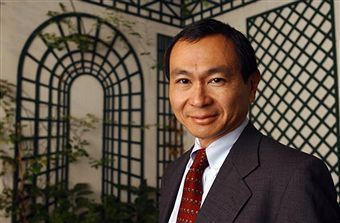 We have Francis Fukuyama writing a cover piece for us this week, revisiting his ‘End of History’ thesis. When he first published it, in 1989, he anticipated what was to become a consensus shared by many, including myself: that autocracy was on the way out. Communism had failed, and was being supplanted by the free society (aka the free market). Capitalism was creating wealth and liberty, and from Minsk to Gdansk people wanted it. Eastern Europe was managing a transition brilliantly. Fukuyama¹s thesis seemed to sum up an incredible spirit of optimism.
We have Francis Fukuyama writing a cover piece for us this week, revisiting his ‘End of History’ thesis. When he first published it, in 1989, he anticipated what was to become a consensus shared by many, including myself: that autocracy was on the way out. Communism had failed, and was being supplanted by the free society (aka the free market). Capitalism was creating wealth and liberty, and from Minsk to Gdansk people wanted it. Eastern Europe was managing a transition brilliantly. Fukuyama¹s thesis seemed to sum up an incredible spirit of optimism.
Perhaps this optimism turned to hubris. After 9/11 Tony Blair and George Bush wanted to accelerate history, and bring democracy to countries which just needed to get rid of their dictatorships. I agreed at the time, and denounced as patronising the idea that Arabs were incapable of democracy. Japan, the country of Fukuyama¹s father, has culture very different from the West but had managed transition after American occupation. South Korea did too. Why not the Arab world, with its culture and tradition of market bazaars? Turkey and Malaysia proved there was no contradiction between Islam and democracy
But there is, alas, no question that autocracy is back. China has managed to combine capitalist-inspired wealth with communist authoritarianism – fusing together what had seemed to be irreconcilables. Fukuyama says in his piece that Russia¹s young remember the 1990s as a decade of humiliation, not liberation. He also says that so much depends on the right people. While Poland and Estonia managed a successful transition, Ukraine did not it lacked the politicians. Great revolutionaries do not always make great leaders.
Most strikingly, Fukuyama says he did not realise the extent to which George W Bush¹s wars would blacken the name of democracy, making it a word which had connotations to Guantanamo bay. The ‘rainbow revolutions’ of 2006 have been slowly reversed and we have a piece explaining this by John Laughland, who served as an election monitor in many of those nations.
Those who regarded Fukuyama¹s End of History as an important book will find his evolving ideas fascinating. He still thinks the right side is winning: liberal democracy is still seen as the best form of government. But the rise of capitalist autocracies – from Venezuela to Russia – show that history has a few more surprises to spring.
UPDATE: The “end of history” did not, of course, mean that things would stop happening (which, Publius and Jeremy, I’m sure you know). Fukuyama intended this as an attention-grabbing headline for a book which suggested that the world no longer had two competing forms of government and that freedom – as expressed through liberal democracy – had no rival. Fukuyama says in his piece that he still believes this to be the case, although the transition to democracy is by no means one-way. As logdon and Sir Graphus say, a rival thesis is Huntington’s “clash of civilizations” (both started off as articles in Foreign Affairs) The wider point is that made by YouCannotBeSerious! – that 1989 showed the end of Communism but capitalist autocracies have meanwhile done quite well.







Comments